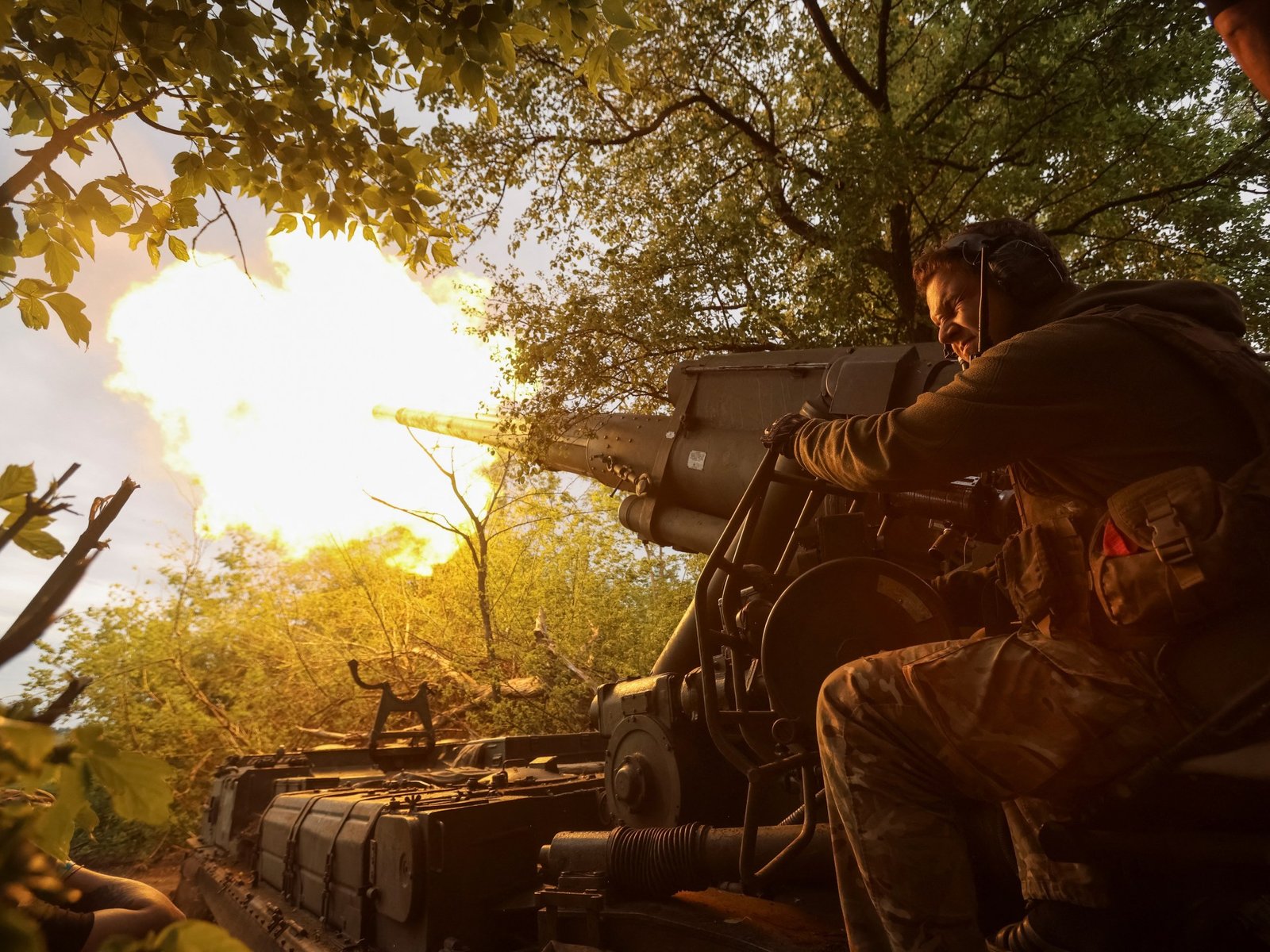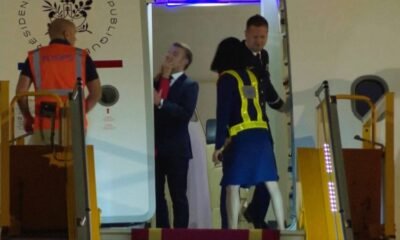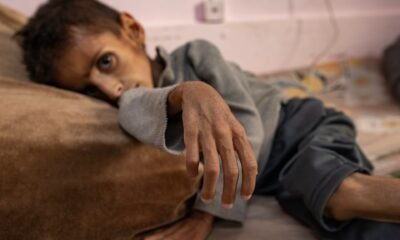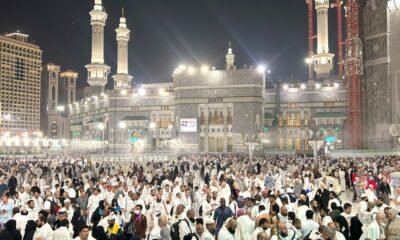Conflict Zones
Russia-Ukraine war: List of key events, day 1,115 | Russia-Ukraine war News

These are the key developments on day 1,115 of Russia’s war on Ukraine.
Here is the situation on Saturday, March 15:
Fighting
Russian President Vladimir Putin called for beleaguered Ukrainian troops in the Russian region of Kursk to “surrender”, saying that “if they lay down their arms and surrender, they will be guaranteed life and dignified treatment”.
Putin’s remarks were broadcast on Russian television hours after United States President Donald Trump said that “thousands” of Ukrainian troops were surrounded by the Russian military in Kursk, adding that he has “strongly requested” Putin to spare their lives.
Ukraine’s General Staff denied again that its forces in Kursk were encircled by Moscow’s troops and said that any reports to that effect were “fabricated by the Russians for political manipulation and to exert pressure on Ukraine and its partners”.
A Russian missile struck a residential area in the central Ukrainian city of Kryvyi Rih, injuring 11 people, including two children, the regional governor said. Kryvyi Rih is Ukrainian President Volodymyr Zelenskyy’s hometown and has been the target of repeated attacks in Russia’s three-year full-scale invasion of its neighbour.
Russian guided bombs struck a series of targets in Ukraine, including a residential area in the southern Ukrainian city of Kherson, killing one person, the regional governor said on Telegram.
Near Ukraine’s Black Sea city of Odesa, Russian drones attacked the port of Chornomorsk, cutting power completely to the area’s residents, the regional governor said.
Russian air defences downed four Ukrainian drones attacking the Russian capital, Moscow Mayor Sergei Sobyanin said. One drone damaged the roof of an apartment building a few kilometres from the Kremlin. Several other buildings were lightly damaged by drone fragments, but there were no injuries, according to emergency officials.
A far-right anti-Russian activist was shot dead on a street in Odesa and a suspect has been arrested, Zelenskyy said on Telegram. The suspect, a 46-year-old man, was described as a “deserter” from the Ukrainian army. Police said, “We cannot rule out the possibility that this crime was committed on behalf of Russian secret services”.
Ceasefire
Putin met with US envoy Steve Witkoff to discuss details of the US proposal for a 30-day ceasefire in Moscow’s war on Ukraine, asking him to convey Moscow’s thoughts to Washington, Kremlin spokesman Dmitry Peskov said.
Trump said he was “being a little bit sarcastic” when he repeatedly claimed as a presidential candidate that he would have the Russia-Ukraine war solved within 24 hours – and even before he even took office. “Well, I was being a little bit sarcastic when I said that,” Trump said in a clip released in advance of a television interview to be broadcast on Sunday.
In a speech at the US Department of Justice, Trump said that ceasefire negotiations with Russia were ongoing and praised his relationship with Putin, saying that the Russian leader “has respect for this country”. He again suggested that Ukraine was to blame for Russia’s 2022 invasion, saying, “You don’t want to pick on somebody that’s a lot larger than you.”
United Kingdom Prime Minister Keir Starmer accused Putin of not taking US-led attempts to secure a ceasefire in Ukraine seriously.
French President Emmanuel Macron in a post on X, also called on Moscow to stop its “acts of violence” in Ukraine.
G7 foreign ministers warned Russia of new sanctions unless it accepted a ceasefire “on equal terms”, saying sanctions could include “caps on oil prices, as well as additional support for Ukraine, and other means”.
Politics and diplomacy
European support for Ukraine will be discussed in a video conference with about 25 European Union and other world leaders, as well as Zelenskyy, on Saturday. Diplomatic sources said EU foreign affairs chief Kaja Kallas is to propose that the 27-country bloc supply up to 40 billion euros ($43.5bn) in new military aid to Ukraine.
The UK’s Starmer will urge leaders from the so-called “coalition of the willing”, which includes Europe, Australia, Canada and New Zealand, to make concrete commitments to support Ukraine and increase pressure on Russia to accept a ceasefire during the video conference.
Russian Deputy Foreign Minister Andrei Rudenko is visiting North Korea, North Korean state media report.
Russia and Venezuela announced plans to increase energy cooperation after Washington ordered US oil giant Chevron to pull out of the Caribbean country.
Conflict Zones
Ballet helps fight war fatigue in Ukraine’s front-line Kharkiv city | Russia-Ukraine war

In the Ukrainian city of Kharkiv, escaping the war with Russia is nearly impossible.
On certain days, when the wind shifts, residents of this historic city can hear the distant rumble of artillery fire from the front line, some 30km (18.5 miles) away.
Most nights, Russian kamikaze drones packed with explosives buzz overhead as parents put their children to bed.
Three years since Russia’s invasion of Ukraine, the unrelenting war exerts a heavy psychological burden on many in Kharkiv. Yet, there is a place in the city where, for a few fleeting hours, the war seems to vanish.
Beneath the Kharkiv National Academic Opera and Ballet Theatre, in a dim, brick-walled basement, a dance company has established a refuge from drones and bombs – a space where audiences can lose themselves in performances of classic ballets.
In April, this underground venue hosted performances of Chopiniana, an early 20th-century ballet set to the music of Frederic Chopin. Despite the improvised setting, the ballet was staged with full classical grandeur, complete with corps de ballet and orchestra.

It marked a significant milestone for Kharkiv’s cultural life: the first complete classical ballet performance in the city since February 2022, when Russian troops launched their invasion of Ukraine.
“In spite of everything – the fact that bombs are flying, drones, and everything else – we can give a gift of something wonderful to people,” said Antonina Radiievska, artistic director of Opera East, the ballet company behind the production.
“They can come and, even if it’s just for an hour or two, completely immerse themselves in a different world.”
Despite Ukraine’s rich tradition in classical ballet, the art form now seems far removed from the everyday existence of Ukrainians living through war. Daily routines revolve around monitoring apps for drone alerts, sleeping on metro station floors to escape air raids, or seeking news of loved ones on the front line. Pirouettes, pas de deux and chiffon tutus feel worlds away.
Nevertheless, the journey of Kharkiv’s ballet through wartime reflects the ways in which Ukrainian society has adapted and evolved.
On February 23, 2022, the National Academic Opera and Ballet Theatre staged a performance of the ballet Giselle. The next day, Russia launched its full-scale invasion. As Moscow’s forces advanced towards Kharkiv and threatened to seize the city, the theatre closed its doors and much of the ballet troupe departed.
Some regrouped in Slovakia and Lithuania, mounting ballet productions abroad with assistance from European sponsors.

By 2023, although the conflict ground on, the situation in Kharkiv, in Ukraine’s northeast, had stabilised after Russian ground troops withdrew. A new realisation took hold – this was a long-term reality. Locals began referring to the city, and themselves, with the Ukrainian word “nezlamniy”, meaning invincible.
That year, work began on transforming the theatre’s basement into a performance venue. By October 2023, it was being used for rehearsals. The following spring, authorities permitted the theatre to admit audiences, and small-scale ballet performances, including children’s concerts, resumed.
The revival of Chopiniana marked the next chapter in Kharkiv’s wartime cultural journey.
Staging a classical opera again signals that Ukraine endures, says Igor Tuluzov, director-general of Opera East. “We are demonstrating to the world that we really are a self-sufficient state, independent, in all its aspects, including cultural independence,” he said.
The auditorium now seats 400 people on stackable chairs, compared with the 1,750 seats in the main theatre above, where the plush mustard seats remain empty.
The stage is a quarter the size of the main one. Grey-painted bricks, concrete floors, and exposed pipes and wiring form a stark contrast to the varnished hardwood and marble of the theatre above. The basement’s acoustics, performers say, fall short of the cavernous main auditorium.
For artistic director Radiievska, however, the most important thing is that, after a long pause, she and her troupe can once again perform for a live audience.
“It means, you know, life,” she said. “An artist cannot exist without the stage, without creativity, without dance or song. It’s like a rebirth.”
Conflict Zones
Sudan Paramilitary Claims Key Gains in Kordofan; Fighting Intensifies Near Khartoum

Khartoum, May 30, 2025 — Rapid Support Forces (RSF) deputy leader Abdel Rahim Daglo announced on Friday that RSF fighters would press their eastward advance toward Khartoum, claiming “great victories” in several strategic towns across Kordofan. Addressing troops at an undisclosed location, Daglo said that all armed groups within the Tasis coalition had joined his paramilitary ranks and were now operating in concert with the RSF.
According to Daglo, RSF units seized control of Al-Dubaibat and Al-Hammadi in South Kordofan state, as well as Al-Khawi in neighboring West Kordofan. “Our fighters have secured these areas after intense clashes with Sudanese Armed Forces (SAF) units and allied militias,” Daglo declared, adding that the momentum would not wane until the capital was within reach.
Sudan’s army, however, downplayed recent RSF advances as part of a “reorganization” campaign. A senior ally of the SAF—also the governor of Darfur—insisted that the military was regrouping and fortified its positions to counter what he described as “a temporary setback.” He maintained that the SAF’s strategic reserves remained intact and that front-line forces were being repositioned to mount a sustained defense of Khartoum.
As fighting has spread northward, the humanitarian situation in Khartoum has deteriorated sharply. With basic services all but collapsed, a deadly cholera outbreak has emerged in the densely populated capital. Aid agencies warn that the impending rainy season could exacerbate sanitation challenges, fueling further disease transmission. The United Nations has labeled the crisis “the world’s worst humanitarian emergency,” citing over 25,000 confirmed deaths and more than 3 million internally displaced persons since April.
International pressure has also mounted on Sudan’s transitional government. In late May, Washington imposed sanctions on Sudanese military leaders for the “alleged use of chemical weapons” against civilians. In response, the government announced a national investigation into the claims—a move it said was aimed at preserving Sudan’s international standing amid intensifying conflict.
With both sides entrenching their positions around Khartoum, observers warn that a protracted stalemate could unleash further civilian suffering. The RSF’s pledge to advance eastward has raised concerns that front-line engagements may spill into densely populated suburbs, where millions have already endured weeks of intermittent shelling and aerial bombardments. For now, the fate of Khartoum—and the broader prospects for peace—remain uncertain as paramilitary and army forces brace for a decisive showdown.
Conflict Zones
Two killed in Russian attacks on Ukraine before possible talks in Turkiye | Russia-Ukraine war News

Russia has confirmed it will send a delegation to Istanbul, but Kyiv has not yet accepted the proposal.
Russian drone and missile attacks on Ukraine have killed at least two people, according to officials, as Ukraine ordered the evacuation of 11 more villages in its Sumy region bordering Russia.
Russian troops launched an estimated 109 drones and five missiles across Ukraine on Friday and overnight, the Ukrainian air force said on Saturday, adding that three of the missiles and 42 drones were destroyed and another 30 drones failed to reach their targets without causing damage.
The attacks came amid uncertainty over whether Kyiv will take part in a new round of peace talks early next week in Istanbul.
In the Russian attacks on Saturday, a child was killed in a strike on the front-line village of Dolynka in the Zaporizhia region, and another was injured, Zaporizhia’s Governor Ivan Fedorov said.
“One house was destroyed. The shockwave from the blast also damaged several other houses, cars, and outbuildings,” Fedorov wrote on Telegram.
A man was also killed by Russian shelling in Ukraine’s Kherson region, Governor Oleksandr Prokudin wrote on Telegram.
Moscow did not comment on either attack.
Meanwhile, authorities in Ukraine’s Sumy region said they were evacuating 11 villages within a roughly 30-kilometre (19-mile) range from the Russian border.
“The decision was made in view of the constant threat to civilian life as a result of shelling of border communities,” the regional administration said on social media.
Ukrainian President Volodymyr Zelenskyy has said some 50,000 Russian troops have amassed in the area with the intention of launching an offensive to carve out a buffer zone inside Ukrainian territory.
Ukraine’s top army chief, Oleksandr Syrskii, said on Saturday that Russian forces were focusing their main offensive efforts on Pokrovsk, Torets and Lyman in the Donetsk region, as well as the Sumy border area.
Syrskii added that Ukrainian forces are still holding territory in Russia’s Kursk region – a statement Moscow has repeatedly denied.
The evacuations and attacks came just two days before a possible meeting between Kyiv and Moscow in Istanbul, as Washington called on both countries to end the three-year war.
Russia has confirmed it will send a delegation, but Kyiv has not yet accepted the proposal, warning the talks would not yield results unless the Kremlin provided its peace terms in advance.
Zelenskyy said Saturday it was still not clear what Moscow was planning to achieve at the meeting and that so far, it did not “look very serious”.
-

 Africa4 days ago
Africa4 days agoSurvivor of Liverpool car ramming talks of shock and panic
-

 Sports3 days ago
Sports3 days agoThe Knicks are bringing hope and title dreams back to New York after years in the doldrums
-

 Lifestyle4 days ago
Lifestyle4 days agoFaizan Zaki hopes to go from spelling bee runner-up to champ
-

 Lifestyle3 days ago
Lifestyle3 days agoChildren and careers: Talking to kids about what they want to be when they grow up
-

 Lifestyle4 days ago
Lifestyle4 days agoHow to decorate a patio, balcony or other small outdoor space
-

 Europe5 days ago
Europe5 days agoMacron’s marital shove disappears from French airwaves
-

 Middle East4 days ago
Middle East4 days agoThe cost of conscience: I lost friends for defending Palestinians | Israel-Palestine conflict
-

 Middle East5 days ago
Middle East5 days agoHajj pilgrimage in Saudi Arabia to begin on June 4 | Religion News




